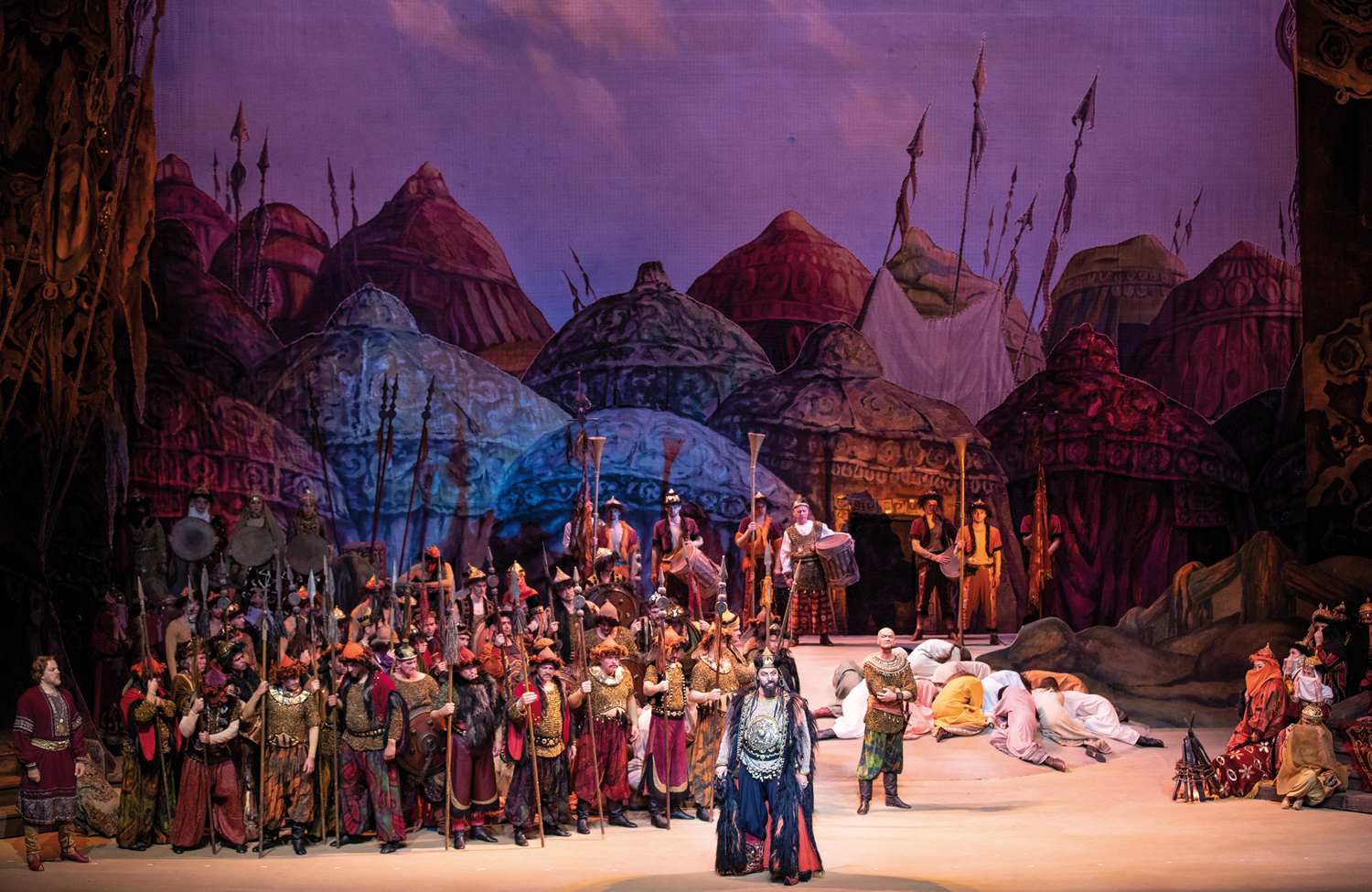

The first Opera of the season, a dark, dramatic tale from the Russian twelfth-century, Prince Igor of Seversk, based on the old Russian legend, ‘The Tale of Igor’s Raid’, opened at the Royal Opera House Muscat on Thursday evening. It captivated the audience with its historical drama of courage after an ill-fated military campaign. It was written by Alexander Borodin in the rich, romantic style of Russia’s “Mighty Handful”, reflected in its minor moods and chromatic phrases, and was premiered by the famous Mariinsky Theatre, St. Petersburg in 1890. It was fitting and a privilege, therefore, that the world-famous Valery Gergiev should have conducted the Mariinsky Orchestra, Chorus, and Ballet in the visiting 2001 production last weekend.
‘Prince Igor’ was an epic performance of Shakespearian proportions, an opera in Four Acts lasting over three hours, with a cast of three hundred. The curtain rose to reveal a splendid scene of pomp and patriotism in the ancient Russian city of Putivi (now Chernigov). Prince Igor, sung beautifully on Thursday night by feted Russian singer, 44-year-old Yevgeny Nikitin, is getting ready for a campaign against Polovtsian (or Cuman) nomads who are launching devastating attacks on Russian territory. The set was imposing and impressive; the backdrop painted in 1954 by famous artists, Melnykov and Tikhonova, to resemble the town square without being fussy or distracting, and sat royally to complement the unfolding plot.
The arctic-born bass-baritone Nikitin is celebrated for his Wagnerian breadth of tone, and huge versatility in languages and styles. His compassionate interpretation of the role was truly beguiling for its powerful, heroic qualities. Capable of such intensity yet warmth, it recalled the great Chaliapin himself. A lengthy Overture unusually provided an Entr’acte between Prologue and Scene Two which gave the audience a chance to appreciate the Mariinsky Orchestra under its world-renowned conductor, Valery Gergiev. Lush cello lines and haunting Cor Anglais melodies suggested Turkish origins, albeit stylised by 19th-century romanticism, of the Tartar camp. In 1988 Gergiev was appointed Music Director at the Mariinsky, and since 1996 he has been its Artistic and General Director. Under his direction it has become a major theatre and concert complex, achieving its own Brand Label, without comparison anywhere in the world.
Scene Two was delightfully full of Eastern promise, with curtained tents and the Arabian Nights costumes of the Polovtsian maidens. The painted scene behind of a lake and broad sky was cleverly transformed through evocative lighting. A love interest had developed between Khan Konchak’s daughter and Prince Igor’s captive son, Prince Vladimir. Georgian mezzosoprano Anna Kiknadze sang the role of Konchakovna with depth, warmth and gravitas.

Opposite her Prince Vladimir was performed by the unlikely 50-year-old Leningrad-born tenor, Yevgeny Akimov, who met the vocal challenge with clarity and fine placing. In contrast, Igor’s famous soliloquy, “No Sleep, No Rest for my Tormented Soul”, bemoaning his captivity yet accepting his fate with princely resignation, and tenderly recalling his beloved wife, Yaroslavna, was moving and full of pathos, receiving a well-deserved ovation.
The appearance of Mikhail Kolelishvili’s larger-than-life Khan Konchak was as arresting as it was superb. The 44-year-old Moscow-born Bass is a master of the Russian bass repertoire, and his stage presence, vocal control and sheer charisma were astounding.
He stole hearts and the show. A blood-curdling song describing torture and enslaving his female captives in Act 2 only added to his strength of character and appeal! Impressed by Igor’s pride and valour, he orders the captive women and warriors to entertain and cheer the gloomy Igor with dances glorifying the mighty Konchak.
The famous Polovtsian Dances - and Signature Dance of the Mariinsky Ballet - provided the climax to Act 1 with its iconic 1909 choreography by Michel Fokine. The ladies danced the exquisite first dance, adapted as “Stranger in Paradise” for the musical, Kismet, with convincing grace and movement, while the strong third dance, with its booming off-beat bass was somehow understated and disappointing. Some energetic dancing from the warriors front of stage brought the 100-year-old classic to a rousing finale.
The Prima Donna of the opera had to wait until the second Act to take centre stage, but it was a performance well worth waiting for. Tatiana Pavlovskaya sang the challenging role of Yaroslavna with incredible control, often entering out of nothing at the top of her register. It was a taxing second half, as she had several consecutive scenes, from her lament outside the city walls of Putivi to her chamber within the Terem Palace.
Critics have commented on Pavlovskaya’s versatile Russian style as, ‘delicate, yet sensual and rich in shading, giving a deep tone quality’ making her one of today’s most outstanding sopranos. She was enchanting, bewitching and compelling in her deeply felt performance, reflecting her vast experience as a soloist in widely diverse roles. The scenes were only broken by peasant girls’ complaints against her slimy seducer-brother, Prince Galitsky, who has abused his privileged status with treason and drunken debauchery. He was played perfectly wickedly by the impertinent Bass, Vladimir Vaneyev, who was actually hissed in the curtain call!
In the final scene, Princess Yaroslavna, the Boyars and People’s Chorus are resolved to defend their land against the invading armies, when suddenly, out of the blue, the escaped Prince Igor burst in to embrace his wife and end her nights of anguish.
On that brazen climax, the curtain fell. Sadly Borodin died in 1887 before finishing the score, so it was completed and orchestrated by Rimsky-Korsakov and his brilliant young student, Alexander Glazunov. One can only conjecture what Borodin would have made of the finished work, but the Muscat audience made its opinion very clear, with repeated curtain calls and applause, despite the late hour.
GEORGINA BENISON
Oman Observer is now on the WhatsApp channel. Click here



